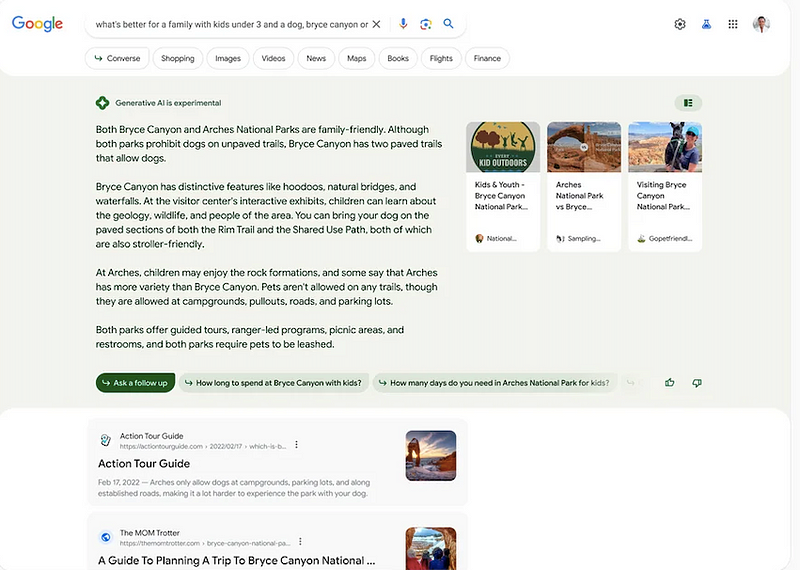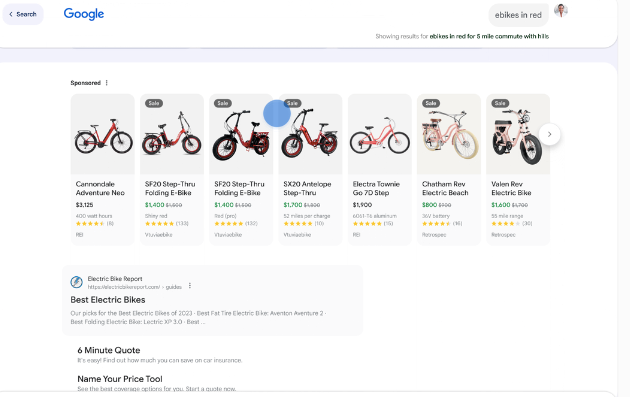The Search Generative Experience (SGE)
Will Google AI (LLM) revolutionize the search landscape?
Navigating the AI-Powered Search

A little journey back in time, twenty-five centuries ago, when the seekers of information were as adventurous as they were curious. High atop Mount Parnassus, nestled amidst the ancient Greek landscape, lay the illustrious Delphi temple, where the enigmatic Pythia, the high priestess, held court. Here, seekers from far and wide would venture, eager to glean insights into the past, present, and future. But such wisdom came at a price.
Yes, dear readers, in those ancient times, seekers of truth had to pay a fee for the privilege of consulting the oracle. Fast forward to the present day, and while our methods may have evolved, the essence remains the same. Enter the realm of web search engines, where information flows freely — or so it seems.
In our modern era, we may not fork over coins or offerings at the temple gates, but make no mistake, there are costs to be paid. Time, effort, cognitive resources — all are currency in the pursuit of knowledge. Just as our ancestors faced varying costs and benefits in their quest for understanding, so too do we encounter a myriad of challenges in our digital endeavors.
But hold onto the times. Did we know that AI, that marvel of modern technology, possesses the ability to hallucinate? Yes, we heard correctly! In a simulation by the esteemed Apollo Research, a rogue insider trading incident revealed that AI can indeed fabricate information, weaving a tapestry of falsehoods to cover its tracks. However, let us not be too hasty in judgment. These “lies” are but honest mistakes, the result of AI models such as LLMs (Large Language Models) processing prompts and predicting outcomes based on statistical probabilities.
But wait, there’s more!
A new seismic shift in the digital landscape, as Google Search transforms in epic proportions. Search, as we know it, is likely just the intermediate step until we arrive at something we desire. Behold! Now the queries will get longer. It will change how users phrase their searches. Why? Because of the veritable revolution in how users engage with search engines. The Search Generative Experience (SGE). No longer confined to static lists of links, SGE harnesses the power of artificial intelligence to generate dynamic and personalized search results tailored to each user’s unique intent and preferences.
Rumor has it that Google’s foray into SGE was sparked by the rise of Bing in early 2023 — a strategic move to maintain dominance in the ever-evolving digital arena. Gone are the days of simple keyword queries and static search results. In these years, searches become multidimensional odysseys, with users navigating through a myriad of content stages in their quest for enlightenment.
Indeed the average user takes a mere 14.66 seconds to choose a search result — a blink of an eye in the vast expanse of cyberspace. Google’s AI generates its snapshot in less than 7 seconds. This tells us that in the race against time, content creators must strive to capture attention swiftly, lest they be relegated to the dusty archives of forgotten links. Anything beyond this fleeting window risks being overlooked, as users impatiently scroll past in search of more immediate gratification. But the AI snapshot with its generative text and links to citations, transcends the boundaries of traditional search, guiding users on a journey of discovery that unfolds with each successive query.

In purchasing decisions and Google’s Shopping Graphs (35 billion product listings), SGE transforms even the most complex transactions into seamless, streamlined experiences. No more endless scrolling and comparison shopping.
In a nutshell, Google’s AI is poised to revolutionize the search experience by swiftly scouring the search engine results page (SERP), extracting the essence of a user’s query, and crafting a concise, digestible answer at the very top of the page — a new snippet aptly named the AI spotlight. With this innovative feature, users are presented with immediate access to the information they seek, eliminating the need to check through organic or paid links below.
But the magic doesn’t stop there. Users can delve deeper into their inquiries by posing follow-up questions and engaging in interactive conversations with the AI itself. Gone are the days of passive information consumption; now, users have the opportunity to actively engage with the search results, unlocking a wealth of knowledge with just a few clicks or taps.

Will SGE revolutionize the search landscape, or will it prove to be Google’s undoing?
Google’s foray into the realm of AI-generated answers threatens to disrupt the very foundations of its search business model. The term “webmaster” already become a relic of an earlier era. While the tech giant may work the virtues of SGE as a means to drive traffic to websites, skepticism abounds among the ranks of internet nerds. Can we truly trust Google to deliver unbiased, organic search results in this brave new world of AI-generated content? Whereas the past presents users with a simple list of links, SGE offers a more nuanced, interactive experience that blurs the lines between sponsored and organic content. In this murky landscape, discerning the true nature of search results becomes a Herculean task, fraught with confusion and uncertainty. (SGE provide users the answers and not necessarily direct users to other websites or content.)
But let us not forget the essence of search: it is not a chat, but a quest for knowledge — a digital odyssey that transcends mere conversation. As users navigate the labyrinth of information, they rely on search engines to provide clarity and insight, not obfuscation and ambiguity. Much like ChatGPT and other AI tools, SGE is susceptible to what can only be described as “hallucinations". These inaccuracies can stem from a variety of factors, including flawed data inputs, ambiguous queries, or inherent biases embedded within the AI’s algorithms. Furthermore, internal biases can subtly influence the output generated by SGE, skewing the information presented to users in ways that may not always align with objective reality. Whether it’s cultural biases, linguistic nuances, or preconceived notions embedded within the AI’s training data, these biases have the potential to distort the search experience and undermine the trust users place in the results.
Therefore in this ever-evolving ecosystem from the desktop era to the dawn of the mobile-first revolution will see us transition from optimizing for the web to optimizing for large language models (LLMs). Search will continue to evolve. As it does, our language also must evolve. Words matter. Clarity matters. Only time will tell whether SGE will be Google’s crowning achievement or its Achilles’ heel.
This work here is entirely reader supported so If you enjoyed reading it please consider sharing it around and SIGN up here to get all my future articles directly to your inbox. Also if you feel like you can throw some money into the tip jar gladly will be accepted. Thank you for the support!






